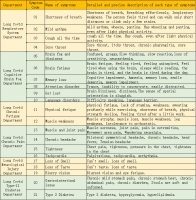TCM Physician Help A Woman Relieve Long COVID Brain Fog

According to reports, in the late stage of COVID-19, about 30-60% of people still have persistent symptoms, of which, about 20-30% of the symptoms are even more obvious than the early symptoms of the disease, and patients still have dizziness, fatigue, dyspnea, chest tightness, memory loss, insomnia and other troubles after recovering from COVID-19.
FOR IMMEDIATE RELEASE / PRURGENT
Ms. Liang, who lives in Kowloon City, Hong Kong, is a freight forwarding company employee. Due to their work, she and her colleagues often come into contact with overseas goods. Even though they have taken strict protective measures, Ms. Liang was still infected with COVID-19 in February 2022.
Her initial symptoms were fever, chills, and difficulty breathing, and then she started losing her sense of smell. Then she went to Queen Elizabeth Hospital in Hong Kong for treatment. Since the symptoms were not very serious, the hospital asked her to go home and take antipyretics by herself. After returning, she took antipyretics every 4 hours and measured blood oxygen every 1-2 hours for three consecutive nights. On the third day, she began to cough with thick yellow phlegm. It was not until the eighth day that Ms. Liang's symptoms were relieved, and the PCR test was also negative.
Ms. Liang thought she could return to everyday life and work after recovering from COVID-19. Still, about a week after her recovery, she began to experience symptoms such as mild dizziness, heavy head, and lack of concentration. After that, she also felt exhausted daily; even if she rested at home and did not participate in physical labor, she still felt fatigued.
Ms. Liang consulted a doctor, who believed this was a manifestation of long COVID symptoms, and the doctor advised her to undergo post-COVID treatment. Ms. Liang has some background knowledge of traditional Chinese medicine. She found a report by Dr. Lai Xiangjun from the Department of Internal Medicine of the Affiliated Hospital of China Medical University. The report said that the long COVID symptoms could be improved through traditional Chinese medicine conditioning, guided rehabilitation, physical education, and health tea, so she decided to improve her long-term COVID symptoms through Chinese medicine treatment.
Infection by pathogenic substances such as viruses and bacteria is collectively referred to as "wind" in traditional Chinese medicine. Due to the cold, hot, and humid body constitution, the symptoms and syndromes will change after the illness. Chinese medicine gives corresponding drug treatment according to different constitutions and syndrome types, so-called different treatment methods for the same disease, and the same treatment method for various conditions.
Suffering from long COVID, Ms. Liang sought help from Dr. Li, a traditional Chinese medicine practitioner at the long covid care center. Combining the diagnosis of traditional Chinese medicine and the inspection report of western medicine, Dr. Li prescribed a targeted Chinese medicine prescription for Ms. Liang.
Dr. Li also recommends Daoyin rehabilitation, such as Baduanjin and Taijiquan are perfect methods. In terms of life and diet, people must maintain good work and rest and living habits, such as drinking plenty of water, maintaining adequate sleep, doing more gentle stretching exercises, and avoiding high-intensity strenuous exercise; avoiding grilled, fried, and spicy foods in your diet, and avoid intake of Excessive sweets, ice products, do not drink alcohol, etc.